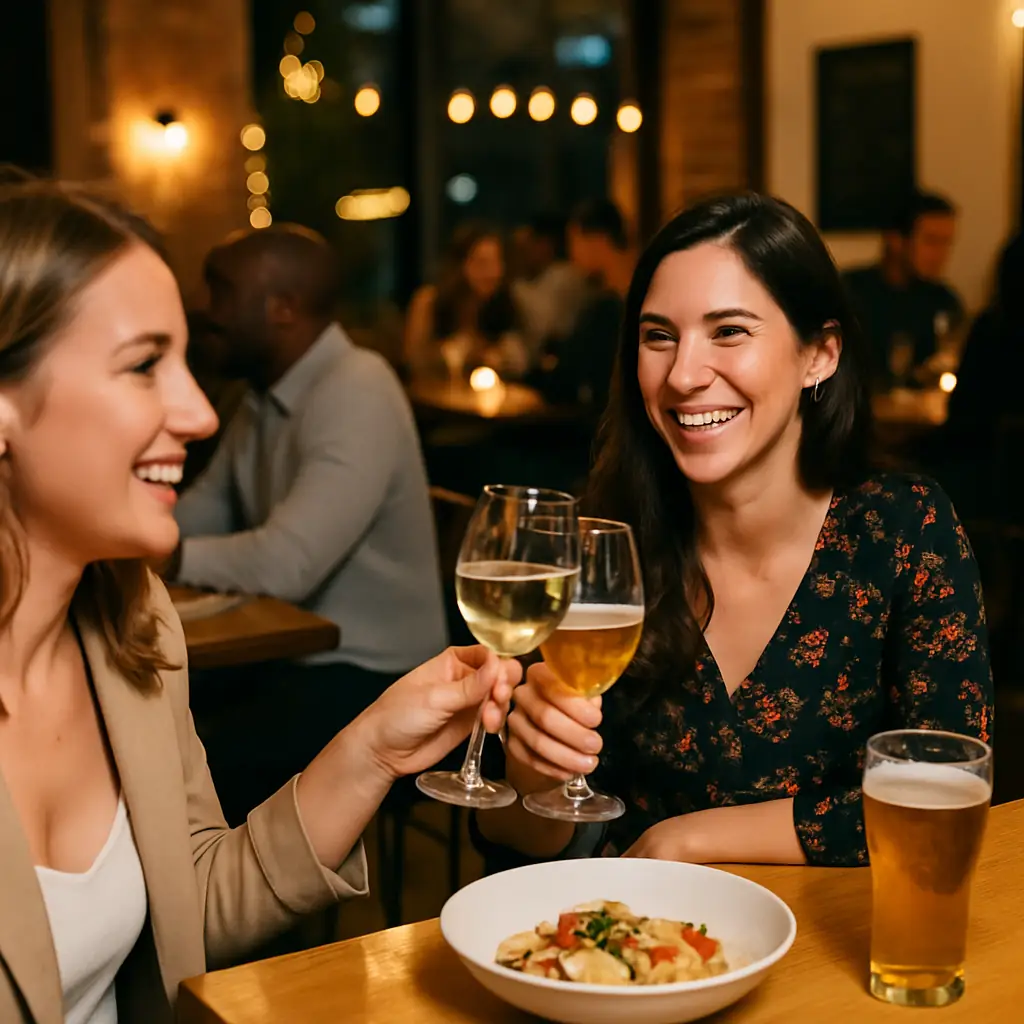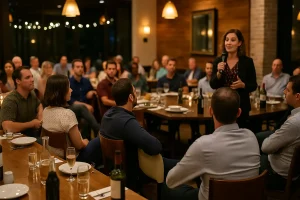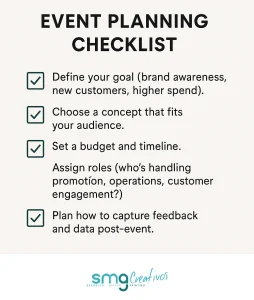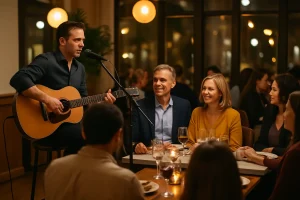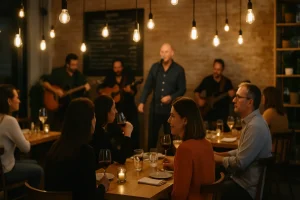In a crowded dining landscape, standing out is no longer optional—it’s essential. That’s where restaurant event marketing comes in. Hosting and promoting events can transform a casual visit into a memorable experience, boost foot traffic, generate buzz, and build lasting relationships with your guests. Whether you’re running a small neighborhood café or a high-end restaurant, events can play a crucial role in driving business and building your brand.
Restaurant events create a sense of urgency and excitement. They give customers a reason to choose you over the competition—not just for the food, but for the experience. And with the right strategies, these events can turn first-time guests into loyal fans who share your brand with others.
Today’s customers crave connection, entertainment, and personalization. A well-executed event offers all of that. From themed dinners to live music nights, trivia contests, or cooking classes, events help restaurants tap into emotions, community, and storytelling—all key ingredients for customer loyalty and viral marketing.
But throwing an event isn’t enough. To see real results, you need a solid event marketing plan. That means identifying the right type of event, promoting it across multiple channels, engaging attendees before, during, and after, and measuring performance to optimize future efforts.
Types of Events That Work Well for Restaurants
There’s no one-size-fits-all when it comes to event types. The right event for your restaurant depends on your brand, space, customer base, and goals. Some events are great for generating buzz, while others focus on building community or increasing sales on slower nights.
Here are a few types of restaurant events that consistently deliver strong returns:
- Live Music or DJ Nights: Attract crowds and build atmosphere with local talent.
- Trivia or Game Nights: Encourage longer stays and larger groups.
- Theme Nights (e.g., Taco Tuesday or 80s Night): Offer a fun twist that gives customers a reason to plan their visit.
- Food and Drink Tastings: Feature seasonal ingredients, new menu items, or local pairings.
These events don’t have to be extravagant. Sometimes, a simple concept with the right vibe and promotion can outperform a large, complicated affair.
Benefits of Hosting Events at Your Restaurant
Events can solve multiple challenges restaurants face—from low visibility to customer retention. They’re powerful marketing tools with the potential to multiply your reach and revenue.
First and foremost, events give you a reason to promote your business without sounding like a sales pitch. Instead of saying, “Come eat here,” you’re inviting people to an experience they’ll remember and talk about.
Events also improve your average ticket size. People tend to spend more during an event—ordering appetizers, drinks, and desserts. Plus, guests often bring friends and family, expanding your audience.
Additionally, events help you collect valuable customer data. Through RSVP forms, contests, and feedback surveys, you gain insights into what your customers like, when they prefer to dine, and how to improve your offerings.
Reasons Why Restaurant Events Boost Business:
- Drive traffic during slow days or off-peak hours.
- Increase average spend per table.
- Strengthen your connection with local communities.
- Generate user-generated content and online buzz.
How to Choose the Right Event for Your Restaurant
The most successful events align with your brand and appeal to your target audience. If you run a wine bar, a paint-and-sip night might be perfect. For a family-friendly diner, a kids’ pancake morning or holiday event may work better.
Start by asking yourself:
- What are your busiest and slowest times of the week?
- Who are your most loyal customers?
- What values or interests do they share?
- What resources (staff, space, budget) can you realistically dedicate to the event?
Research what’s worked well for other restaurants in your area, and see if there’s a gap you can fill with your unique twist. Think seasonal too—Mother’s Day brunches, Valentine’s tasting menus, or Oktoberfest beer nights are always crowd-pleasers.
And remember, exclusivity drives demand. Events like “one-night-only” menus or “VIP preview tastings” build anticipation and a sense of privilege.
Event Planning Checklist:
- Define your goal (brand awareness, new customers, higher spend).
- Choose a concept that fits your audience.
- Set a budget and timeline.
- Assign roles (who’s handling promotion, operations, customer engagement?).
- Plan how to capture feedback and data post-event.
Promoting Your Restaurant Event Like a Pro
You’ve planned an amazing event—now you need people to show up. Promotion is key, and the earlier you start, the better. Begin at least 3–4 weeks in advance and use a multichannel strategy to reach your audience.
Use your social media platforms to build anticipation. Create a Facebook event, post countdowns, behind-the-scenes sneak peeks, or teaser videos. Use Stories and Reels to show your staff prepping, the setup process, or past event highlights.
Email marketing works great for notifying your most loyal customers. Send personalized invites and follow-ups. If you use a reservation platform, send targeted event invitations to recent diners.
Leverage your Google Business Profile by adding events, which helps increase visibility in local search. And don’t forget about local influencers and press. Reach out with a well-crafted pitch and offer free entry or meals in exchange for coverage.
Restaurant Event Promotion Tips:
To build anticipation for your upcoming event, make sure to engage your local audience through multiple online and offline touchpoints. Here are a few effective strategies:
-
Create an event-specific hashtag and encourage sharing.
-
Use QR codes in-store to promote online RSVP.
-
Run a small ad campaign on Facebook or Instagram targeting locals.
-
Add countdown widgets or popups on your website.
Additionally, collaborate with local influencers or food bloggers who resonate with your brand. Offering them early access, free meals, or exclusive content in exchange for social media coverage can significantly extend your reach and build excitement around the event. Their followers trust their recommendations, making their endorsement a powerful promotional tool.
Don’t forget to involve your team in the promotion process. Train your staff to mention the event during customer interactions—whether at checkout, over the phone, or through reservation confirmations. When the promotion feels personal and comes from someone the guest has interacted with, it can drive higher conversion and attendance.
Boosting Engagement During the Event
The event isn’t just about turnout—it’s about creating a memorable experience that encourages future visits. Make sure your staff is trained and enthusiastic, and that your venue matches the tone of the event.
Incorporate interactive elements that guests will want to share on social media. A photo booth, a wall with your event hashtag, live cooking demos, or a signature cocktail station are great additions.
Encourage live posting. Offer a free dessert or raffle entry for those who post a story and tag your account. These posts become free advertising in real time, especially if your followers share them too.
Also, collect feedback during the event. Place comment cards at tables or run a digital survey afterward with a reward like a discount on their next visit.
Ways to Increase Engagement at Events:
To make the most of your event, focus on creating memorable experiences that keep your audience engaged during and after the event. Consider implementing the following ideas:
- Offer giveaways or raffle prizes.
- Display your social media handles and hashtags prominently.
- Thank attendees with personalized follow-up messages.
- Ask for reviews or testimonials while the experience is fresh.
Post-Event Marketing: Don’t Let the Buzz Die
The event might be over, but your marketing shouldn’t be. Post-event content helps you stay top-of-mind, attract future guests, and show new followers what they missed.
Share photos, video recaps, and customer testimonials. Highlight best moments and tag guests who posted about it (with permission). Create a carousel post or reel that captures the energy of the event.
Use post-event email follow-ups to say thanks and offer a small incentive to return—maybe 15% off their next meal or early access to the next event. This encourages repeat business while the good vibes are still fresh.
Also, analyze what worked. What time did people arrive? What menu items sold best? How did your social media metrics perform? Use this insight to plan better and scale future events.
Post-Event Actions That Drive Long-Term Impact:
Create a highlights album and pin it on Instagram or Facebook.
Publish a blog post recap with pictures and guest quotes.
Add attendees to your newsletter list (with consent).
Ask attendees to review you on Google or Yelp.
To keep the momentum going, consider sending a follow-up email thanking guests for attending and offering a small incentive, such as a discount on their next visit or early access to your next event. This not only shows appreciation but also encourages return visits while the experience is still fresh in their minds.
You can also use the event as a springboard for new content. Share behind-the-scenes videos, staff interviews, or bloopers from the night to humanize your brand and extend the life of the event online. Repurposing event material for social media and future marketing keeps your restaurant visible and top-of-mind long after the event has ended.
Restaurant Event Marketing for Different Goals
Different types of events serve different marketing purposes. Understanding the “why” behind each event helps you set the right expectations and measure the right metrics.
If your goal is brand awareness, focus on public events with wide appeal and online buzz potential. Look at metrics like reach, impressions, and mentions.
For loyalty and retention, invite-only dinners, member-exclusive previews, or loyalty card launch events build deeper customer connections. Measure attendance, return visits, and email sign-ups.
For sales growth, plan events during slow periods with strong call-to-actions like “limited seating” or “2-for-1 specials.” Measure ticket sales, check averages, and ROI.
Event Goals and Matching Strategies:
- Awareness → Free public events + social media push.
- Loyalty → VIP nights or member-only tastings.
- Revenue → Ticketed experiences or themed up-sell nights.
- Reviews → Ask for Google/Yelp feedback post-event.
Incorporating Events into Your Marketing Calendar
Treat restaurant events like campaigns. Don’t just host them randomly—tie them into your yearly marketing strategy. Aim to host at least one event per quarter, aligning with seasons, holidays, or key promotions.
Create a marketing calendar that includes events, prep times, promotional windows, and post-event engagement. This structure keeps you organized and ensures you get the most out of each campaign.
Also, look at how events tie into broader goals. Want to boost weekday sales? Plan a Tuesday trivia night. Launching a new menu? Host a tasting event. Looking to get more social media followers? Build a photo-worthy themed party.
When events become part of your brand rhythm, customers start looking forward to them—and even plan around them.
Annual Event Calendar Ideas for Restaurants:
- January: New Year Detox Menu Launch
- February: Valentine’s Day Dinner + Live Music
- April: Easter Brunch for Families
- July: Summer BBQ Patio Bash
- October: Halloween Costume Night
- December: Holiday Wine Tasting Party
Make Events a Core Marketing Strategy
Restaurant event marketing isn’t just about filling seats for one night—it’s about building a brand people remember, talk about, and keep coming back to. When you combine creativity, planning, and consistent promotion, events become powerful engines for growth.
By aligning each event with your brand identity and audience preferences, you’ll create experiences that feel authentic and valuable. And when guests feel something, they share it—with friends, online, and in future visits.
So don’t wait for slow nights or special occasions. Start planning your next event today, and make it a signature part of your restaurant’s success story.



